

Train Your Brain to Think Like a Creative Genius. 10 Paradoxical Traits Of Creative People. Editor's Note: This is one of the most-read leadership articles of 2013.
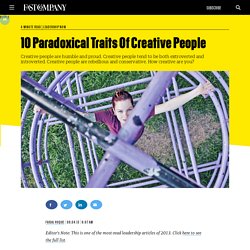
Click here to see the full list. I frequently find myself thinking about whether I am an artist or an entrepreneur. I am simply trying my best to create my own unique path. It is safe to say that more and more entrepreneurs are artists, and artists of all kinds are entrepreneurs. And the trend is only on the rise as all things (art, science, technology, business, culture, spirituality) are increasingly converging. Creativity is the common theme that drives both entrepreneurs and artists alike.
Over this past Labor Day weekend, I found myself reading excerpts from distinguished professor of psychology and management Mihaly Csikszentmihalyi’s (pronounced me-HIGH chick-sent-me-HIGH-ee) seminal book Creativity: The Work and Lives of 91 Eminent People (HarperCollins, 1996). He writes: Mihaly describes ten traits often contradictory in nature, that are frequently present in creative people. 1. 2. 3. 5. 6. 7. 8. 10. Givers, Takers, and Matchers: The Surprising Science of Success. By Maria Popova Counterintuitive insight on what makes people thrive from the wunderkind of organizational psychology.
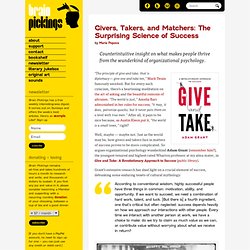
“The principle of give and take; that is diplomacy— give one and take ten,” Mark Twain famously smirked. But for every such cynicism, there’s a heartening meditation on the art of asking and the beautiful osmosis of altruism. “The world is just,” Amelia Barr admonished in her rules for success, “it may, it does, patronize quacks; but it never puts them on a level with true men.”
After all, it pays to be nice because, as Austin Kleon put it, “the world is a small town,” right? Well, maybe — maybe not. Grant’s extensive research has shed light on a crucial element of success, debunking some enduring tenets of cultural mythology: According to conventional wisdom, highly successful people have three things in common: motivation, ability, and opportunity. At the heart of his insight is a dichotomy of behavioral styles people adopt in pursuing success: Donating = Loving. The Quartet of Creativity: 28-Year-Old Susan Sontag on the Four People a Great Writer Must Be. By Maria Popova “A great writer has all 4 — but you can still be a good writer with only 1 and 2.”
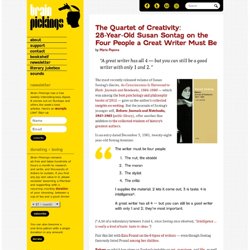
The most recently released volume of Susan Sontag’s diaries, As Consciousness Is Harnessed to Flesh: Journals and Notebooks, 1964-1980 — which was among the best psychology and philosophy books of 2012 — gave us the author’s collected insights on writing . But the journals of Sontag’s younger self, Reborn: Journals and Notebooks, 1947-1963 ( public library ), offer another fine addition to the collected wisdom of history’s greatest authors . In an entry dated December 3, 1961, twenty-eight-year-old Sontag itemizes: The writer must be four people: The nut, the obsédé The moron The stylist The critic 1 supplies the material; 2 lets it come out; 3 is taste; 4 is intelligence*. How Does IQ Relate to Personality? Personality and IQ have traditionally been viewed as distinct domains of human functioning.
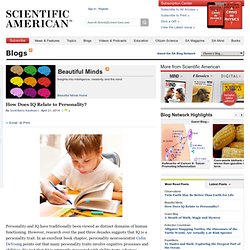
However, research over the past three decades suggests that IQ is a personality trait. In an excellent book chapter, personality neuroscientist Colin DeYoung points out that many personality traits involve cognitive processes and abilities. It’s just that IQ is primarily measured with ability tests, whereas personality tests are primarily measured with questionnaires. But this is more a reflection of a lack of ingenuity on the part of psychologists than a real difference in domain of human functioning.
It’s theoretically possible to measure personality traits through ability tests. To help us see that picture, I analyzed data from the Eugene-Springfield community sample, which consisted of 478 mostly White participants from Eugene and Springfield, Oregon. Consistent with prior research, IQ was most strongly related to openness to experience. . © 2014 Scott Barry Kaufman, All Rights Reserved. Original Mad Man David Ogilvy on the 10 Qualities of Creative Leaders. How to Be a Better Artist. My mother is a self-taught painter—one of her watercolors hangs framed in our living room.
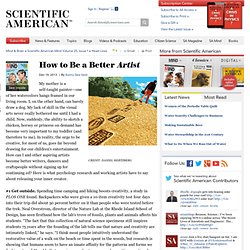
I, on the other hand, can barely draw a dog. My lack of skill in the visual arts never really bothered me until I had a child. Now, suddenly, the ability to sketch a chicken, horsey or princess on demand has become very important to my toddler (and therefore to me). In reality, the urge to be creative, for most of us, goes far beyond drawing for our children's entertainment. How can I and other aspiring artists become better writers, dancers and craftspeople without signing up for continuing ed? #1 Get outside. . # 2 Let your freak flag fly. . #3 Leave the country. . #4 Just play. Are Writers Born or Made? Jack Kerouac on the Crucial Difference Between Talent and Genius.